|
Following
Gandhi's Path - Part 10
If the
West Is Like Pop,
India Is Like Bach
By Jan
Oberg
Director of
TFF
My journey in India is coming to
an end. I have met Buddhist youth from Tibet and visited
historical places and ashrams connected with Gandhi. I
have visited Varanasi or Benares, the holiest Hindu town
where people seek salvation in the Ganges River's waters
which are crawling with colon bacilli. I have seen the
old and sick waiting to die so that their corpses can be
burnt in a great fire and the ashes spread over and taken
away by the river.
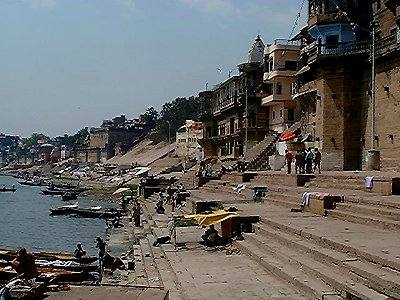
Photo Jan Öberg, © TFF
2001
The Ganges River,
Varanasi
I have also visited places of central importance to
Buddhism - Bodghaya, where the young Gautama was
enlightened under the pipal tree, and Sarnath, where he
first spoke to his disciples.
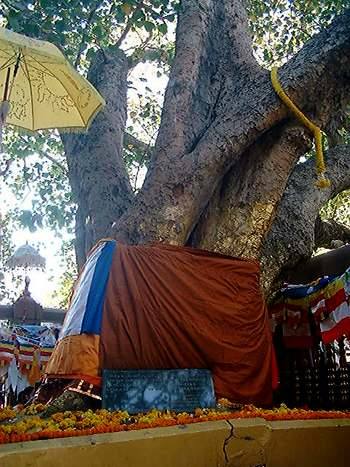
Photo Jan Öberg, © TFF
2001
The pipal or bodhi tree in
Bodghaya - where Buddha experienced
enlightenment
I made a trip to Rajgai where Buddha lived for 12
years and I admired the peculiar rock formation,
Gridhakuta, where he is said to have given his most
important lectures.
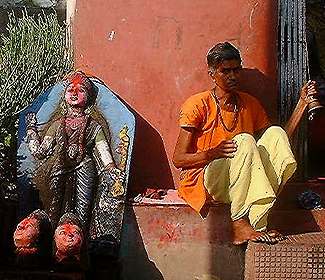
Photo Jan Öberg, © TFF
2001
Entrance to the public bath in
Rajgai
I have also seen the giant and magnificent Peace
Pagoda, built by the Japanese Nichiren Buddhist monk,
Nichidatsu Sufujii Gurujin, in the Rajgiri Hills. Whilst
thinking about him, I am reminded of Gandhi. Gurujin was
born in 1885 and came to India in 1931 where he met
Gandhi. They became friends and Gandhi included, from
that year onwards, Buddhist mantras like
"nam-myo-ho-renge-kyo" in his ecumenical prayers. Gurujin
built more than 70 peace pagodas all over the world and
died at the age of 101.
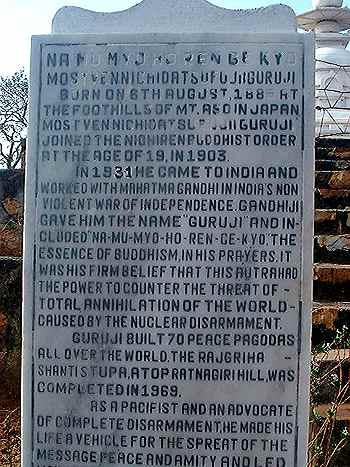
Photo Jan Öberg, © TFF
2001
About Guruji who built 70 peace
pagodas and became Gandhi's friend, Rajgai
I have always thought there are many similarities
between Gandhi's and Buddha's thoughts and actions.
Perhaps I have found one of many keys to these
similarities in Rajgai? I add this to the already long
list of questions that I must investigate more closely
when I describe my journey in a book. India is very
bewildering. But I don't feel any need to know all the
details or make academic analyses.
I came to India in order to experience the country and
to reflect on my own life, the West and the rest of the
world. Now, I feel enriched and content.
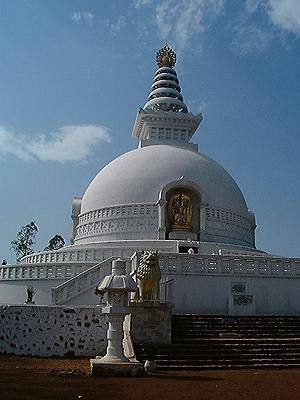
Photo Jan Öberg, © TFF
2001
Peace pagoda on the top o a
mountain outside Rajgai
In the first of my ten articles, I wrote that India
shouldn't actually be possible. Now, I must admit that
this is especially valid for people who come here with a
typically Western-programmed mind-set. To them India must
be - - and is - - incomprehensible. I have spent two
months, living simply, near the people and their everyday
life. Yet, I have only seen a fraction of the country; I
haven't been south of Bombay or east of Gandhi's ashram
in Sevagram. Yet, I have learnt the most important
lesson: one must empty one's mind and thoughts of as many
prejudices as possible in order to meet this equally
fascinating and frustrating country with an open
mind.
There are no simple truths. One might comment about
something that "this is just the way it is", only to find
the next minute that "this is the way it also is." Or
better perhaps: "what I just said is only one part of the
truth, because it might as well be quite the
opposite".
This infinite reality, this simplicity in complexity
and complexity in simplicity, this genuine Indian "unity
in diversity" made me feel very humble. During the course
of two months it made me look upon my own Western world,
the Occident, as somewhat banal, or like a pseudo or pop
culture with quick rhythms, a lot of glitter with shallow
truths which we all keep pounding into our own and our
fellow westerners' minds. If the West is like a pop hit,
India is like the music of Johan Sebastian Bach!
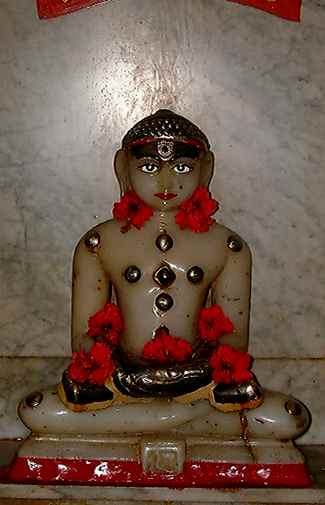
Photo Jan Öberg, © TFF
2001
God in a Jaintemple in Bombay
(Mumbai)
I am struck by a dizzying thought: can all that we
have built up in the West possibly last for as long as
this strangely weak, crisis-ridden, yet majestically
strong India? Maybe the strength of India lies in the
fact that she does not develop the way we would expect?
That India rather is, exists and breathes slowly, saving
its civilisational energy for future use?
In his day, Karl Marx made some very condescending
remarks about India. Yet even today, we can ponder
whether religion serves as a sort of opium for the
people. People are born into a caste; it is an extremely
individualistic and atomised social order, with only a
tiny elite having great mobility, and only slightly more
than half of the inhabitants of India can read and write.
If they, moreover, happen to live in the slums and/or are
women then they don't have a chance. Life and hope lie,
necessarily, beyond the present and material reality.
I can still feel the strong sense of deadlock, of a
hard society where everyone sees each other as
competitors. I have seen too many taxi drivers beating
each other up over the penny they would have earned from
me. Loyalties are almost always vertical, with one's
superiors, with those who have power - including various
gods - and hardly ever horizontal with those who share
the same position or fate. There will be no collective
revolution here, for sure! There is far too much
cringing, false politeness and genuine subservience.
There is a lot of psychological violence connected to the
built-in violence of the social structures.
This is the hard side of India. To it belong the
political cynicism, the corruption, the grotesque class
distinctions, the nuclear weapons, the environmental
pollution, and, last but certainly not least, the
oppression of women.
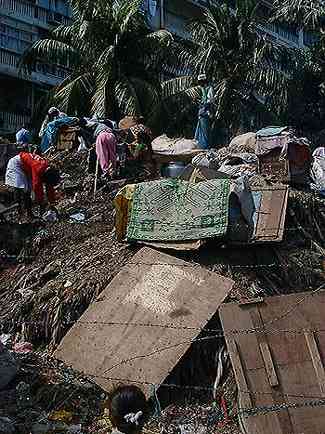
Photo Jan Öberg, © TFF
2001
Slum area in Mumbai, just a few
hundred metres from...
Yet, it is enormously impressive how India has managed
to maintain her soul, her spirit - - not Western and not
Eastern, but simply Indian. In this soft India exists the
spiritual, the consciousness that life is more than just
material matter, the philosophy, the literature, the
Gandhianism, the mixture and co-existence of all the
religions. This is here we can find the India that has
given so much to the rest of the world, but also taught
the British empire a lesson without any hate. The rhythm
of life in this soft India is very slow. Centuries of
invasions from all parts of the world have not been able
to subdue India.
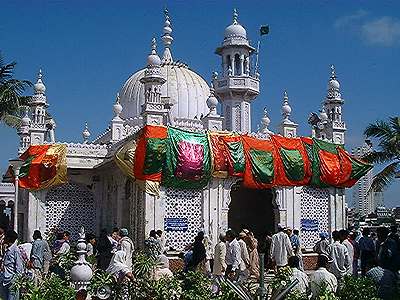
Photo Jan Öberg, © TFF
2001
...the magnificent mosque of
Mumbai.
Both sides of India seem to be summed up in Gandhi:
both the country's Father and Mother, a strong
individualist working on behalf of the collective,
extremely self-conscious, and humbly experimenting with
life itself. He was a Hindu, a Christian, a Muslim and a
Buddhist, yet with a special, eclectic life-philosophy of
his own, according to which "Truth is God and God is
Truth".
And, yet, when one has said that, one must retract it.
Gandhi was actually also the opposite of what India is. I
think he would feel deeply depressed if he suddenly woke
up in today's India. He would be the Number One enemy of
the government, spending most of his time behind
bars.
I did not fall in love with India, so I certainly
cannot be disappointed next time we meet. And that we
certainly will. I will feel more and more challenged by
the visits.
Jan Øberg
Translated by Alice Moncada
Translation edited by Sara E. Ellis
Other
articles about India, "Following Gandhi's Path" and
picture galleries
©
TFF 2001

Tell a friend about this article
Send to:
From:
Message and your name
|